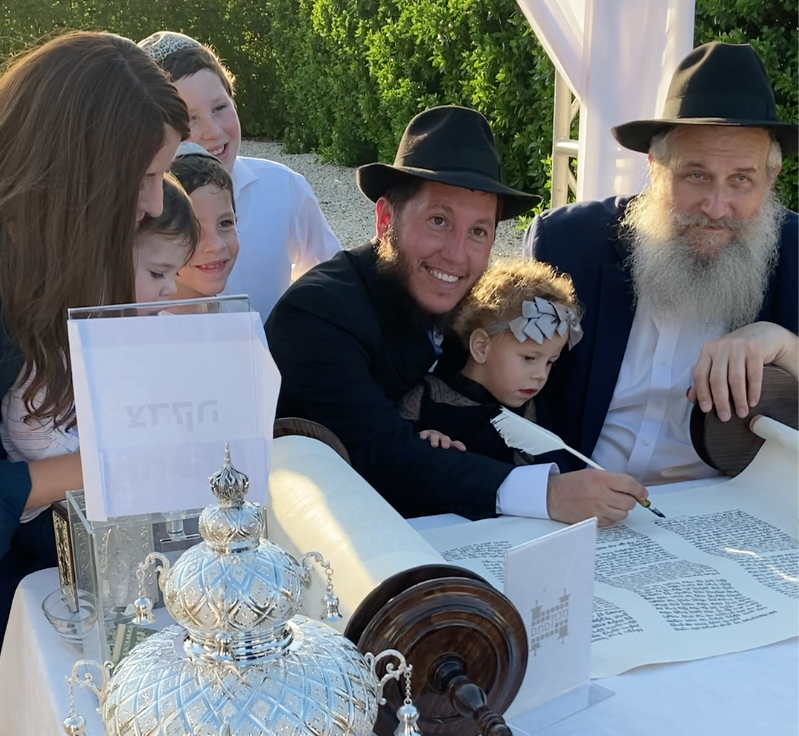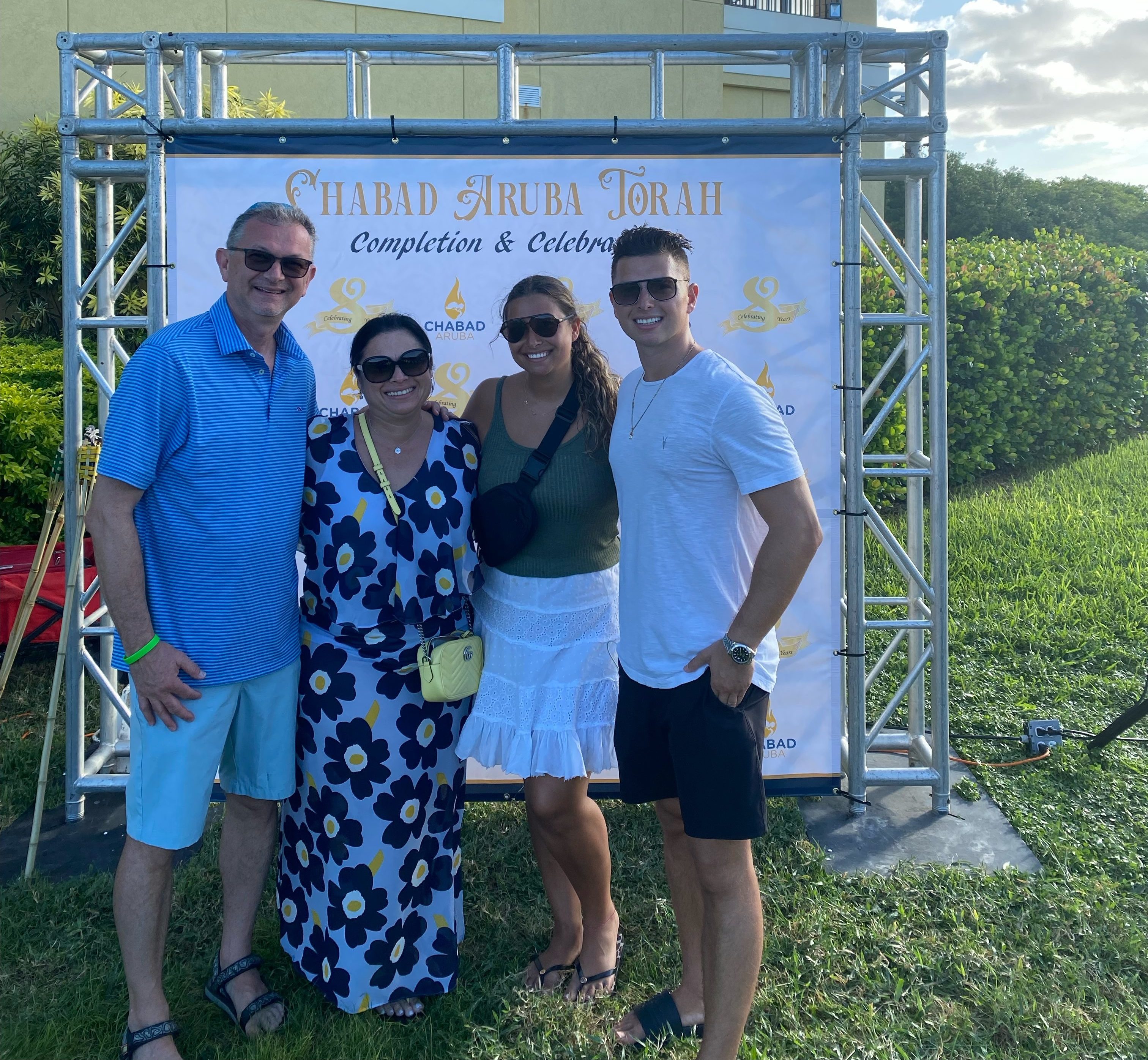To the sound of a fiddler playing Jewish melodies, about 80 people gathered on the north lawn of the Ritz-Carlton resort on Aruba’s Palm Beach to complete the writing of a brand new Torah—in what might’ve seemed like an unlikely place.
It’s the first scroll specially commissioned for the island’s growing Chabad synagogue, established near the high-rise hotels and white sandy Caribbean beaches, which attract waves of tourists from Canada, the U.S., Israel and South America.
Among the guests on Dec. 22 was Maya Liberman, a former Hebrew studies teacher at Toronto’s Holy Blossom Temple. Liberman, her husband and their two children took their seats beside Rabbi Dovid Ehrentreu, the sofer (the Hebrew term for scribe) who flew in from New York.
The family wanted to be in Aruba this winter for the dedication, in memory of her husband’s late father, Nachum Liberman, who died in Thornhill in December 2017.
Eight years ago, during one of their annual trips, they met the newly arrived Chabad rabbi, Ahron Blasberg, through a chance encounter on the street.
“He heard us conversing in Hebrew and he was kind of fascinated,” Liberman recalled. “How it is possible that we’re meeting here in Aruba and Jews are meeting each other?”
After her father-in-law’s death four years ago, they took their annual winter trip—but her husband, Boris, wanted to attend services with a prayer quorum.
“He didn’t want to break his vow of saying kaddish the whole year,” Liberman told The CJN.
Chabad of Aruba made it happen.

Major donor has long ties to Aruba
New York-based financier Philippe Heilberg and his family donated the Torah in honour of his own late father, Jean-Claude Heilberg, who died in 2012. Jean-Claude was a child Holocaust survivor from Belgium who escaped to Cuba before settling in the U.S.
Philippe’s widowed mother Annie Heilberg now lives in Aruba. The donor runs a weather-data company called dClimate, which counts Mark Cuban as one of the investors.
It cost between $50,000 and $60,000 for the full package: a custom-made Torah scroll, the work of scribes in Israel and Aruba, the black velvet and silver Torah covers—and, of course, the commemoration ceremony.
“My mother’s been coming here and dragging me since the 1970s… I was going to dedicate a Torah and why not here?” Heilberg said, noting how the proximity to New York and services offered by Chabad will draw more Orthodox Jews from other places.
The Blasbergs first arrived in December 2013 “on a one-way ticket,” with some kosher chicken, a few prayer books, clothes for their two children (they now have four), and his set of tefillin.
To their surprise, they found a minyan that weekend at a local Marriott Hotel, attended by about 50 people. But there was no sefer Torah to read from, per the custom on every Shabbat.
So, faced with his first challenge as an emissary, the rabbi went on a mission to borrow a scroll from the Chabad centre in Venezuela.
Despite meagre beginnings, the community now has its own synagogue building, where weekly services are held. Friday night dinners are offered for free to visiting tourists, including from cruise ships and those who own time-share condominiums.
Chabad provides kosher meals by request to nearby hotels. There’s also a community Kiddush following services on Saturdays. (Donations are welcome.) A new grocery store has opened nearby called Mazel Tov Mini Market, with kosher products imported from Holland and the U.S.
Aruba has a historic Jewish community
This new Torah isn’t the first on the Dutch island. (Aruba is part of the Kingdom of the Netherlands.) There are several such scrolls at the independent Congregation Beth Israel in the capital city of Oranjestad.
But with the arrival of Chabad, Aruba’s 125-member Jewish community now has two synagogues. Both advertise as representing the Jewish community of Aruba.
However, just as they’re separated by denomination, they’re also separated by geography: the new Chabad centre is on the northwest tip of the island, in Noord.
On the south coast, the egalitarian Beth Israel was established in the 1960s by families of Holocaust survivors. But the Jewish presence on the island actually dates back to the 16th century following the Spanish Inquisition, according to local historians. There’s an old Jewish cemetery with graves from 1563.
Aruba has had two Jewish prime ministers since becoming part of the Netherlands: the first was Henny Eman, in 1986; his brother, Mike Eman, was a strong Chabad supporter who held office until 2017.

A magic word for four Libermans
Back home in Thornhill, the Libermans normally worship at the Beth Chabad Israeli Community Centre in Vaughan. They tried out services at Beth Israel of Aruba, but it wasn’t for them.
“It’s kind of in-between, a more liberal service, but at the same time it’s not what we have here. Here it’s like a home,” said Maya Liberman, who now works as a special education teacher in York Region.
For her daughter, Michelle Liberman, who’s now taking her masters in education at the University of Toronto, this unique Torah ceremony in Aruba isn’t something she’ll likely forget.
“To me, it’s not the typical place for so many Jewish people to come together,” Michelle said. “But it’s really beautiful to see so many Jewish people all over the world… we’re celebrating a simcha, in the middle of COVID.”
It isn’t the first time the Libermans have participated in an event like this. When the Holy Blossom Temple marked its 150th anniversary with the writing of a new Torah scroll in May 2007, the Libermans donated three letters in the Hebrew word shamayim—specifically mayim (מַיִם), which means water.
That word served as a talisman a short time later, when the family’s home was struck by lightning. It saved them again, when a neighbouring house caught fire.
“The only thing that saved us was water,” said Maya.
This is why they asked to apply their family’s donation to the same word, when it appears to describe the heavens at the start of the Book of Genesis: Shamayim.
Now, with the Torah in place, Chabad of Aruba’s next project involves fundraising to build a mikveh.
Author

Ellin is a journalist and author who has worked for CTV News, CBC News, The Canadian Press and JazzFM. She authored the book Double Threat: Canadian Jews, the Military and WWII (2019) and contributed to Northern Lights: A Canadian Jewish History (2020). Currently a resident of Richmond Hill, Ont., she is a fan of Outlander, gardening, birdwatching and the Toronto Maple Leafs. Contact her at [email protected].
View all posts








